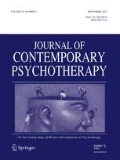Abstract
It is suggested that many of the rules of technique about handling questions of money in analysis have been adopted more because they are self-serving for the analyst than because they genuinely aid the therapeutic process. Examples are given of gross deviations that appear to have enhanced the process rather than interfered with it. The idea is that analysis should be a corrective emotional experience.
Similar content being viewed by others
References
Alexander, F. and French, T. (1946), The Principle of Corrective Emotional Experience.Psychoanalytic Therapy: Principles and Applications, Ronald Press, New York.
Guntrip, H. (1975), My Experience of Analysis with Fairbairn and Winnicott.Int. Rev. Psycho-Anal., (2) 145–156.
Winnicott, D. W. (1971),Playing and Reality, Tavistock, London.
Author information
Authors and Affiliations
Rights and permissions
About this article
Cite this article
Robertiello, R.C. Psychoanalysts and money. J Contemp Psychother 24, 35–38 (1994). https://doi.org/10.1007/BF02306582
Issue Date:
DOI: https://doi.org/10.1007/BF02306582


